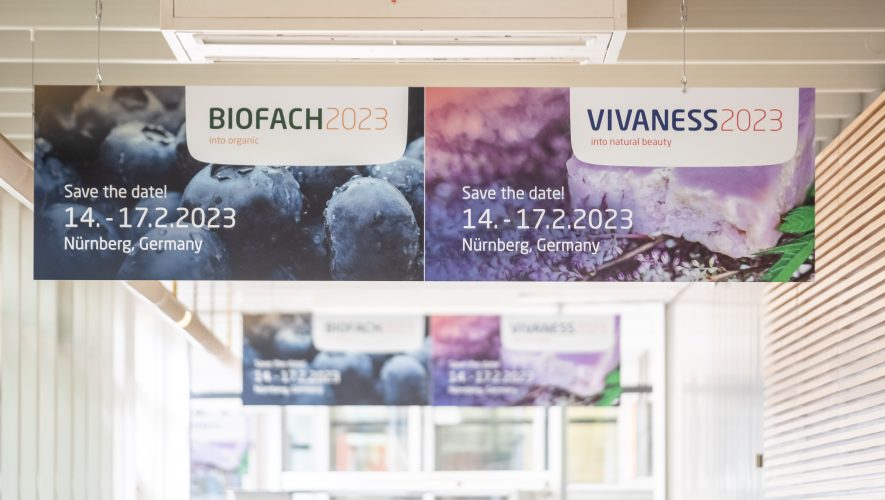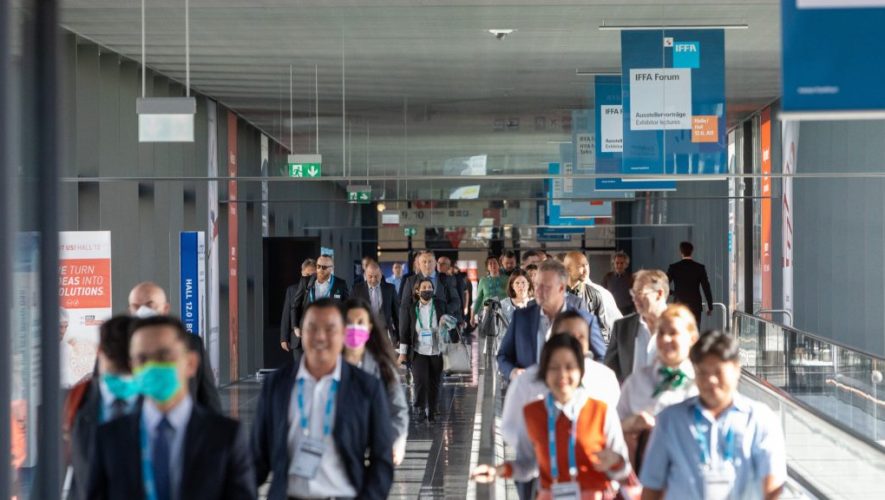At the digital salon, Marco Schlüter, Tina Andres, Max Thinius and Jörg Reuter shed light on the different perspectives of food sovereignty in the context of organic. // © Marco Schlüter, Tina Andres, Max Thinius und Jörg Reuter
At the digital salon, Tina Andres, Chair of the Bund Ökologische Lebensmittelwirtschaft (German Federation of the Organic Food Industry, BÖLW); Marco Schlüter, Interim Executive Director, IFOAM – Organics International; Jörg Reuter, Head of Food Campus Berlin and Managing Director of Artprojekt Nature & Nutrition GmbH; and Max Thinius, futurologist, highlighted the various perspectives and dimensions of food sovereignty and illustrated the correlation between organics and food security.
All four experts on the virtual podium gave a clear “yes” to the question, “Can organics feed the world?” But, they noted, it would also have to involve a thorough transformation of society: The nutritional behaviour of the Global North, for example, would have to develop in the direction of the Planetary Health Diet, which in turn would require the redistribution of areas under cultivation to favour food cultivation. From this angle, food security and food sovereignty function together.
Dimensions of food sovereignty
The digital salon quickly revealed the different dimensions of food sovereignty, as well as how varied these are and the extent to which they are interconnected. Marco Schlüter, Interim Executive Director IFOAM, emphasised that for small farmers, for example, the principal meaning of food sovereignty is the ability to decide freely what they will cultivate, and in which way. “Small farmers, who currently produce about 80 percent of the world’s food, would like to operate independently of the agricultural industry. For them, free access to seed and the opportunity to propagate their own seed and distribute it with no legal restrictions is crucial. This in turn promotes variety in cultivation and makes systems more resilient. After all, biodiverse, stable cultivation systems such as agroforestry and permaculture are a huge lever in the fight against hunger and poverty.” Futurologist Max Thinius considers that many new opportunities will develop for farmers worldwide thanks to new technologies, digital networking and the fact that access to the Internet via a smartphone is almost universal, even in the Global South. “The growth in data collection means a huge amount of knowledge can be accumulated and shared easily, which will contribute to sovereignty for small farmers.”
Ideally, however, food sovereignty involves both producers and consumers. The more knowledge is available, the easier it is to decide in favour of a sustainably produced foodstuff. In this area too, Thinius notes, digitalization will make access to knowledge easier, and it will be directly available to everyone. Conversely, Jörg Reuter, Head of Food Campus Berlin, stresses that eating is always characterized by social habits. Not every choice is based on reason. “A meta-label would help many consumers to decide in favour of environmentally friendly and sustainable products. For example, the Planet Score reflects multiple dimensions in a single traffic-light system. At the same time, we should take the extra step from a Planetary Health Diet to a Planetary Health Lifestyle. The move toward vegan alternatives and alternatives to dairy foods will appear much more obvious to future generations than it does to us. But that transformation still needs more time.”
Tina Andres, Chair of the Bund Ökologische Lebensmittelwirtschaft (German Federation of the Organic Food Industry, BÖLW), looks at policy decisions being made in Berlin and calls for further measures to be put in place on the way toward this transformation. “We need more in-depth research into organics in order to develop the organic system further. In addition, we cannot avoid the need to fully understand external costs, the true costs. Only by having transparent communication and passing on the true costs will it be possible to reduce the added social costs[1]. Multiple crises have clearly shown that organic is more resilient, regenerative and price stable. That has to be communicated with much more emphasis.” Thinius adds, “The increasing transparency regarding origin and processing that consumers demand will put pressure on the industry. Society’s need for more quality and more responsibility cannot be ignored.” Schlüter also calls for greater pragmatism and less ideology: “There are so many examples around the world that work extremely well. This narrative for improved animal welfare, healthier foods and fertile land is something we need to apply motivationally and copy without too much red tape.”
“I firmly believe we will feed ourselves organically, or not at all,” says Andres. “It is essential for the transformation that we highlight what works in our own lives. I am not talking about prohibitions or going without. Quite the opposite: I can fully imagine being able to have a lovely, sustainable holiday some years from now because aeroplanes will be entirely climate-neutral, for example. I can imagine a completely different social system in which we have a high, sustainable standard of living, without losing anything in the process. And that is why we need to create many more positive images and illustrate the options for how we imagine the future.”
That conclusion brought the first digital salon at BIOFACH and VIVANESS to an end, and simultaneously served as an invitation to discuss the theme of “Organic. Food Sovereignty. True Prices” further at this year’s Congress and to become a part of the transformation.



